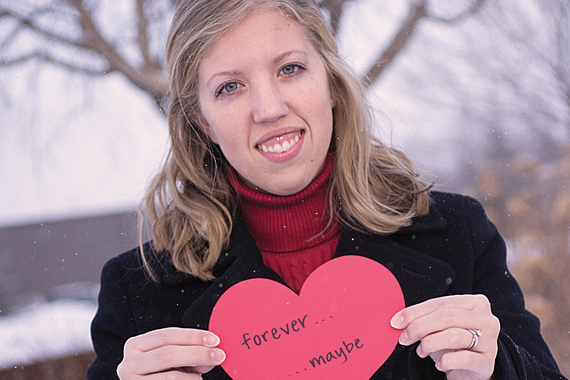
Haven’t we all, at one time or another, sneered at St. Valentine’s Day as a “Hallmark Holiday?” I don’t deny that I’ve done it. Valentine’s Day in our society is about chocolate and cards when it should be about love. But even as I write this, I can hear the mock- ing of the scoffers. Those three words are said too much. They’re not enough, as the lyrics of a popular song go. And why wouldn’t we scoff ? “Til divorce do us part” is now just as appropriate for a wedding as the traditional vow, since divorce is a more likely end to a marriage than death. Co- habitation and no-strings-attached, friends-with-benefits relationships are so common they doesn’t even raise an eyebrow anymore; meanwhile, we continue to spend our money on romantic comedies and wonder in the dark of the night why we can’t seem to fill ourselves up. What is love, and is it enough?
Love is patient, love is kind. I am not patient, and I certainly am not always kind.
It does not envy, it does not boast, it is not proud. Envy, boasting, pride: the foundations of American life. I am trying to acquire the possessions my neighbors have, to convince the world how valuable I am, and my pride is mortified when the world takes no notice.
We look at the trouble in our world, our city and our homes, and maybe we think that love is a lie we’ve bought into to delude ourselves. I’m getting married in May, and with all of the imminent life changes attached to that, I sometimes worry – okay, I often worry – about my choices. What if I didn’t choose the right person for me? This seems like a fair question, until I evaluate the presupposition underlying that statement: that my happiness in marriage is dependent on choosing a person who will make me happy. But is it true? This statement, and all of its accompani- ments – “Do what makes you happy,” “Do whatever feels right,” “Every person must decide for themselves what is right for them” – places the self at the center, and makes every other feeling, decision and person, even a spouse, second to the happiness of the self. [Love] does not dishonor others, it is not self-seeking, it is not easily angered, it keeps no record of wrongs. Love is not self-seeking, and marriage is at bottom, a commitment to put one other person’s needs above your own. To do what makes him happy. Yet we as a people have turned it into just the opposite. The more I ponder this insidious twisting of the meaning of love and marriage, the clearer I can see that my choice in a husband is second to my choice to honor my husband and to seek his happiness.
In the end, my marriage is more about my relationship with the Lord than with my husband. Marriage is, like other choices, events and people, a tool that Jesus uses to shape me. Love does not delight in evil but rejoices with the truth. The truth is that only Jesus can make me happy. Nothing else fills me up and satisfies my always-hungry heart. My choice is to rely on Jesus’ perfect love to build a beautiful marriage with my husband. [Love] always protects, always trusts, always hopes, always perseveres. Love never fails.
PHOTO BY SARAH REED-SZUMANSKI













